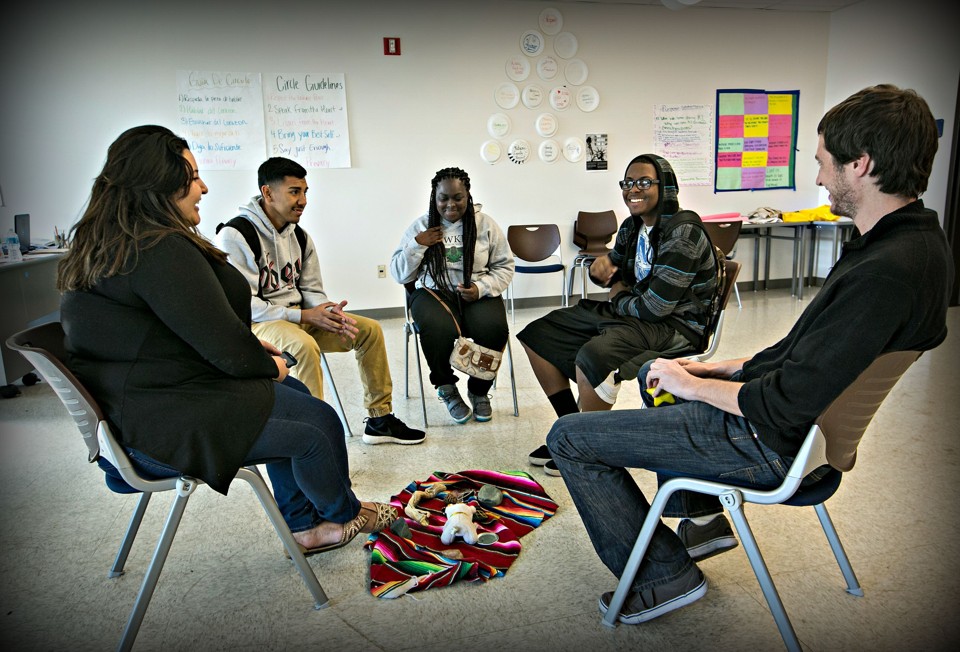Will School-Discipline Reform Actually Change Anything
Districts from Los Angeles to New York City are experimenting with new policies designed to eliminate zero-tolerance discipline. But the reality is often a lot different than the idea.

Damian Dovarganes / AP
Christine Rodriguez vividly recalls her early school years. A native of Brooklyn’sBushwick neighborhood, a working-class predominantly black and Latino section of New York City, her most vivid memories of elementary school consist of crammed classrooms with inadequate books, insufficient chairs, and the constant presence of the school-safety agent. (School Safety Agents, or SSAs, are New York Police Department officers assigned to K-12 campuses and charged with protecting students, campus staff, and visitors.) Now a college freshman at The New School studying education, Rodriguez rattles off with ease how school discipline shaped her K-12 education.
“We go to schools where there are more SSAs than guidance counselors. For us, it makes us feel that they expect us to end up in jail rather than in college,” said Rodriguez, 17. “I’ve been to public school my whole life. I’ve experienced the school-to-prison pipeline”—a term commonly used to describe the trend in which largely disadvantaged students are funneled into the criminal-justice system—“and criminalization (of students). And I’ve questioned why all of these things happen to our communities.”
“We go to schools where there are more SSAs than guidance counselors. For us, it makes us feel that they expect us to end up in jail rather than in college,” said Rodriguez, 17. “I’ve been to public school my whole life. I’ve experienced the school-to-prison pipeline”—a term commonly used to describe the trend in which largely disadvantaged students are funneled into the criminal-justice system—“and criminalization (of students). And I’ve questioned why all of these things happen to our communities.”
Policymakers and educators, among others, are beginning to question the harsh discipline policies and practices that have in recent decades became popular in certain districts, too. Research shows that the reliance on punitive school discipline like suspensions, expulsions, and school arrests—“school pushout”—deprives students of learning time and takes the greatest toll on nonwhite students, students with disabilities, LGBT youth and other vulnerable student groups. Suspensions can even harm the education of non-misbehaving students, according to some research.
The data on the shortcomings of zero-tolerance discipline is clear and overwhelming, and with increasing regularity and in increasing numbers school districts and states are responding to calls for reform. A wide range of approaches to address discipline concerns with new policies and laws are being tested across the country—including in New York City—with varying degrees of success and enthusiasm. Many of these efforts are spurred by grassroots activists, as well as a growing research base suggesting that suspensions—particularly for minor infractions—are a flawed discipline strategy. A 2011 analysis by the advocacy group and think tank Child Trends found that majority of school suspensions are for nonviolent offenses. The analysis cites a study on one large, unnamed urban school district in Florida showing that attendance violations and disrespect were the most common reason for suspensions in the jurisdiction, while another study, this one included in a DOE report, found 95 percent of out-of-school suspensionswere for slight infractions and misbehavior.
The impetus for the emphasis on suspensions—which is still used in many districts and charter-school networks such as KIPP—didn’t have a strong research basis, explained Dan Losen, the director of the Center for Civil Rights Remediesat UCLA’s Civil Rights Project. Instead, schools took a cue from the 1970s War From Zero Tolerance to Restorative Justice: How School Districts Such as Los Angeles and New York Are Reforming Student Discipline - The Atlantic:
The impetus for the emphasis on suspensions—which is still used in many districts and charter-school networks such as KIPP—didn’t have a strong research basis, explained Dan Losen, the director of the Center for Civil Rights Remediesat UCLA’s Civil Rights Project. Instead, schools took a cue from the 1970s War From Zero Tolerance to Restorative Justice: How School Districts Such as Los Angeles and New York Are Reforming Student Discipline - The Atlantic:
